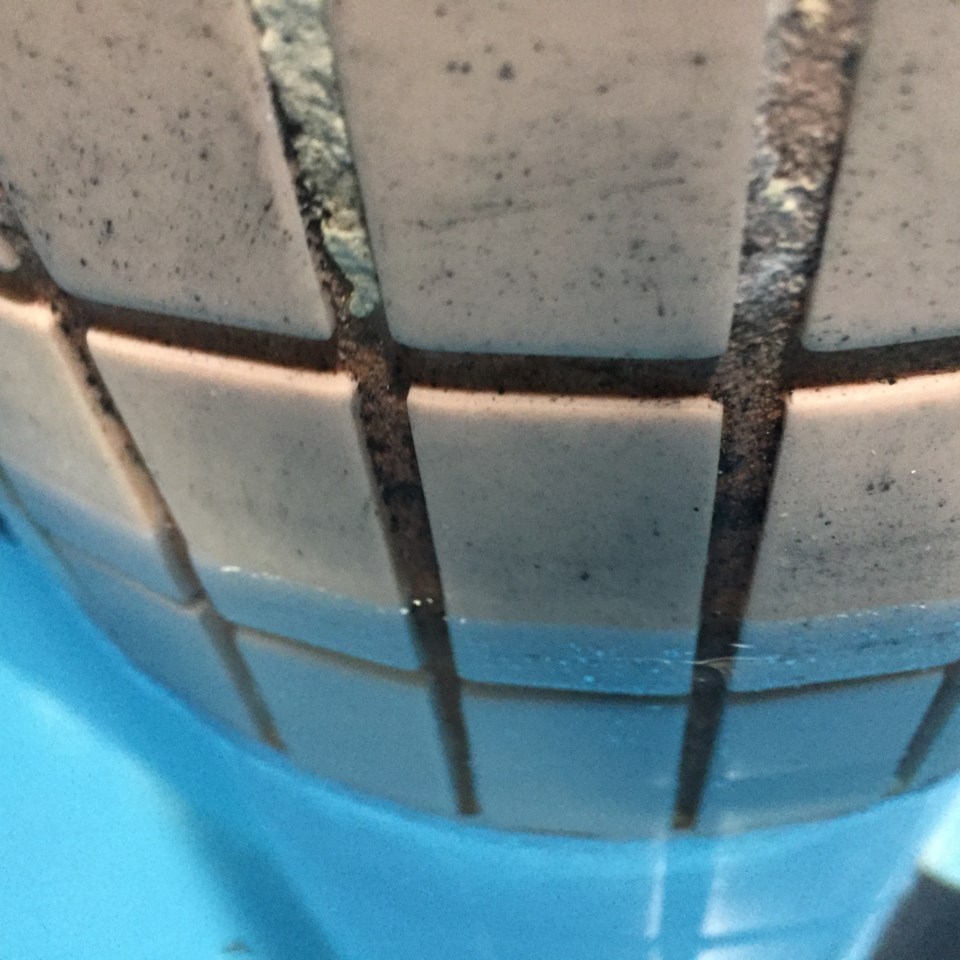A Whistler local who lodged a complaint last year with health authorities wants more answers on a supposed black buildup he said he has regularly observed in the Meadow Park Sports Centre (MPSC) hot tub—despite health authorities assuring the facility to be in clean and safe condition.
A regular visitor to the MPSC since 1997, Bill Duff said he first noticed what he called a “black goo”-like substance sticking to the side of the hot tub walls about two years ago. More recently, he has documented the material—which he said is thick and spreads in one’s fingers “like grease”—in photos he later provided to Pique.
“It’s abnormal and it shouldn’t be there,” he said. “If these black dots are sticking on the side of the pool, they’re sticking to people’s clothing and they’re going into their skin. I’ve experienced itchiness, and I wonder why I’m so itchy, and figure maybe it’s this black stuff.”
Duff said he raised the issue initially with MPSC staff, before lodging his complaint to Vancouver Coastal Health (VCH), in the fall. The health authority said it conducted “a thorough inspection and investigation” in November, on top of a regular inspection of the hot tub in February of this year.
“On both occasions, the [Environmental Health Officer] found the hot tub to be clean, well-maintained, and in compliance with regulatory requirements. Water sampling for potential microbial contamination found none,” a VCH statement read, in part.
In its own statement, the Resort Municipality of Whistler (RMOW), which operates the MPSC, said it independently chose to continue monitoring the situation after the health authority said it was satisfied with its cleaning procedures. The RMOW also carries out regular inspections of the pool and hot tub, per the BC Public Health Act.
“We put considerable focus on cleaning to ensure every patron is comfortable with our quality of service and we are very conscious to remain current with all VCH processes and take any public complaints or concerns seriously,” the statement said.
Both the RMOW and VCH said they were unable to collect samples of the black substance during their inspections, with the attending health officer noting the issue “may have resolved prior to his visit,” VCH said.
The municipality, meanwhile, said although it was unable to replicate the substance seen in Duff’s photos, “we do know body oils and dirt” can cause a black sheen.
“As noted on the pool signage, we do also ask that swimmers always do their part by showering properly before entering the pool as this assists us in keeping it clean,” the RMOW said. “The health and safety of our pool patrons is our primary focus at all times and we want to ensure this individual, and everyone coming into the pool, [is] comfortable and confident we are doing our part to keep them safe.”
Those assurances aren’t enough to put Duff’s mind at ease, who questioned how the municipality and health authority were unable to collect samples of the buildup when he claims to have noticed it “almost 100 per cent of the time” he’s there. He also wonders if the substance is neoprene, a synthetic rubber used for gaskets and seals, among other uses, that had been emulsified by a pump impeller.
“Body oils and stuff that’s excreted from the skin are either translucent, white, yellow or brown, not black,” Duff said. “I’ve been in a thousand hot tubs, and one place you do see black is in this hot tub [at MPSC]. I’ve never seen that in any other hot tub.”
In response, VCH said pump impellers are “unable to ‘emulsify’ a material like neoprene or rubber, however, if the black substance was from a degraded seal, most bulk material would be taken up by the filter in less than 30 minutes, and any other particles would be removed during routine cleaning.”
VCH went on to say that nitrile rubber, a material used for gaskets, o-rings and seals, “is not toxic in a hot tub environment. The material is the same as that used in nitrile gloves, which does not typically cause skin irritation, except in rare cases where an individual is sensitized to it.” Chlorine and other chemicals used to clean pools and hot tubs can cause skin irritation, however, VCH added. “It’s important to take a shower after using a hot tub to rinse those chemicals off the skin. Extended use of a hot tub can also lead to dry, itchy skin."




